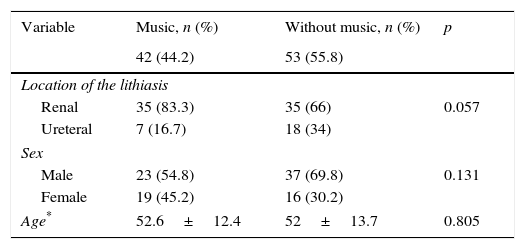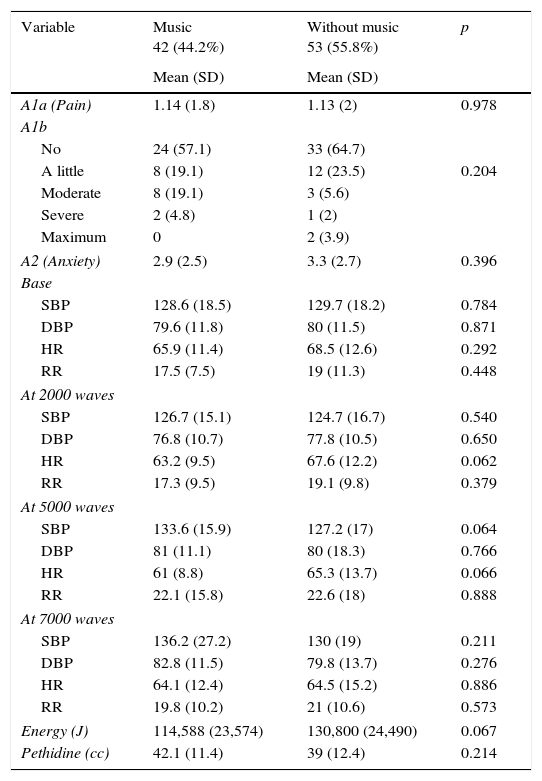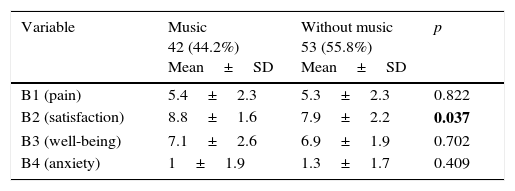The objective of this study was to determine whether listening to music during a session of extracorporeal shockwave lithotripsy (ESWL) improves patients’ pain.
Material and methodA simple, blind randomization was undertaken of patients with kidney and ureter stones attending an ESWL session of 7000 waves for the first time, between September and December 2014. One group was given music and the other was not. The age, gender, location of stones (kidney/ureter) were recorded and 2 questionnaires: pre ESWL (questionnaire A) and postESWL (questionnaire B). Each questionnaire contained a question about anxiety and another question on pain on the Likert scale (0–10). Questionnaire B also had a question on satisfaction and comfort (Likert 0–10). Other variables included heart rate, respiratory rate, systolic and diastolic blood pressure on wave 2000, 5000 and 7000, reason for halting the procedure, total pethidine (mg), secondary analgesia, energy (J) and frequency (Hz). Bivariate analysis using the Student's t-test, X2/Fisher test and a multiple linear regression model.
ResultsThe sample comprised 95 patients, with a mean age of 52 (±13) years, 35 (36.84%) females, 60 (63.2%) males. A total of 25 (26.3%) ureter stones and 70 (73.7%) kidney stones. A number of 42 (44.2%) patients were given music. There were no differences between the demographic variables or questionnaire A scores. Satisfaction and pain were better on questionnaire B with music.
ConclusionMusic can reduce pain and improve patient satisfaction in ESWL treatment. More studies are required to confirm this effect.
El objetivo del estudio fue determinar si escuchar música durante una sesión de litotricia extracorpórea por ondas de choque (LEOC) mejora el dolor de los pacientes.
Material y métodoSe realizó una aleatorización simple y oculta de pacientes con litiasis renales o ureterales que acudieron por vez primera a una sesión de LEOC de 7.000 ondas, entre septiembre y diciembre de 2014. Un grupo recibió música mientras que el otro no. Se registraron la edad, sexo, localización de la litiasis (renal/ureteral) y 2 cuestionarios pre-LEOC (cuestionario A) y post-LEOC (cuestionario B). Cada cuestionario contiene una pregunta sobre ansiedad y otra sobre dolor en escala Likert (0 al 10). El B, además, contiene otra sobre satisfacción y otra sobre comodidad (Likert 0 al 10). Otras variables fueron la frecuencia cardiaca, respiratoria, tensión arterial sistólica y diastólica en la onda 2.000, 5.000 y 7.000, causa de interrupción del procedimiento, petidina total (mg), analgesia secundaria, energía (J) y frecuencia (Hz). Se realizó un análisis bivariante con t de Student, X2/Fisher y un modelo de regresión lineal múltiple.
ResultadosLa muestra incluyó a 95 pacientes, con una media de edad de 52 años (±13), 35 mujeres (36,84%), 60 hombres (63,2%); 25 para litiasis ureterales (26,3%) y 70 (26,3%) para renales (73,7%). Un total de 42 pacientes (44,2%) pacientes recibieron música. No hubo diferencias entre las variables demográficas ni en las puntuaciones del cuestionario A. La satisfacción y el dolor fueron mejores en el cuestionario B con música.
ConclusiónLa música es capaz de disminuir el dolor y mejorar la satisfacción del paciente en los tratamientos con LEOC. Más estudios son necesarios para comprobar este efecto.











